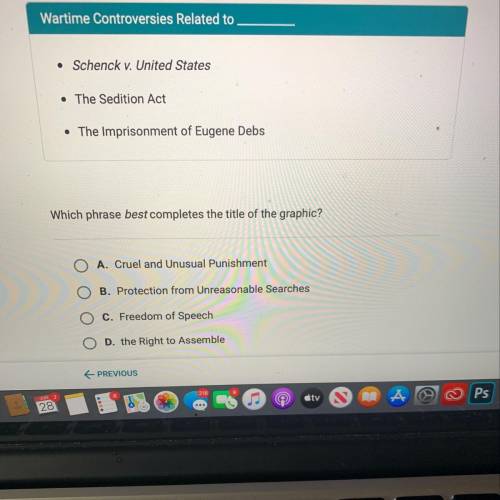Wartime Controversies Related to
• Schenck v. United States
• The Sedition Act
• The Im...

English, 29.06.2020 15:01 genyjoannerubiera
Wartime Controversies Related to
• Schenck v. United States
• The Sedition Act
• The Imprisonment of Eugene Debs
Which phrase best completes the title of the graphic?
A. Cruel and Unusual Punishment
O B. Protection from Unreasonable Searches
O C. Freedom of Speech
O D. the Right to Assemble


Answers: 3
Another question on English

English, 21.06.2019 16:30
Iwill give you 90 points read this entry from a blog about service dogs.lexie, an eight-month-old black labrador retriever, is sleeping quietly at my feet. i can’t but think that her soft, velvety ears and alert brown eyes would make her the perfect “doggie model” for pet magazines and pet store ads. however, lexie will soon have a much more important job to do. in a few months, she will become the loyal companion and service dog for a young man who has been blind since birth. she will him board public transportation, such as buses, subways, and trains, and she will him safely cross busy intersections. lexie will even the young man avoid obstacles, such as high curbs and low overhangs. like all dogs in our organization, lexie has undergone months of specialized training to a visually impaired person lead an active and independent life.what is the primary purpose of this blog? to inform readers about seeing-eye dogsto entertain readers with stories about lexieto persuade readers to support service dogsto convince readers to adopt seeing-eye dogs
Answers: 2

English, 22.06.2019 07:30
Which persuasive technique is used in the passage below? after seeing ads for greasy french fries, sugary soft drinks, and salty chips, you head to the kitchen to fix yourself an enormous (and unhealthy) snack. with the tv blaring in the background, you then waste hours on the web.
Answers: 1

English, 22.06.2019 09:00
Part 2: thoreau’s ideas had a profound effect on a man named gandhi. gandhi, was a leader in india who worked to end british rule. he led india to independence and inspired many to non-violent forms of protest and resistance. he fought to end poverty, worked to expand women's right to vote, and built bridges between ethnic and religious groups. like thoreau, he lived simply, owned very little, and ate a vegetarian diet. in india, gandhi's form of protest was called the "non-cooperation movement." he urged indians to boycott british education systems and leave government jobs. the movement was very popular, and in part to stop its spread, the british controlled government arrested him. after a few years, he was released and became active in politics again. he inspired many to follow him on marches to protest various taxes. on one such march, thousands followed him 240 miles over 24 days to the sea to protest a salt tax. this march set the example of non-violent resistance to the government that others in the country followed. eventually india won independence from britain, in large part because of gandhi work. gandhi's model of resistance and reform was creative, appealing, and successful. as a result, dr. martin luther king looked to gandhi when the time came to find a way to resist segregation in the south. the lunch counter protests, famous for the passive response to anger, and even violence, aimed to end the separation enforced by laws in some regions of the south. king also organized walks, marches, and bus rides that were meant to bring attention to the issues facing african americans. these forms of protest were directly modeled on gandhi's, but king took them straight to the source of oppression. where gandhi's protests created awareness and built momentum, king's protests were in the face of great hatred and fear. the passive, non-violent protests were ultimately effective, mainly because the passive response to violence cast the opposition as brutes. however, change came slowly and at the cost of many lives. king remained committed to peaceful protest, however, until his death. king learned from gandhi, expanding on what worked, applying old techniques to a new problem. gandhi owed his philosophy, in part, to a new england poet who loved the woods. read this sentence from part 2: like thoreau, he lived simply, owned very little, and ate a vegetarian diet. what is the point of this sentence? gandhi and thoreau had similar childhoods. gandhi had many admirable qualities. thoreau and gandhi were very similar. thoreau had a simple life compared to others.
Answers: 2

English, 22.06.2019 11:00
Read this excerpt from we’ve got a job: the 1963 children’s march. then, in 1958, when he was nine, his mother got a job as a dental assistant – and a raise. at about the same time, wash got a job, too. six days a week for eight years, he woke up by four o'clock in the morning to deliver milk. by the time he got to school each day, he'd already put in almost half a day's work. how does this excerpt readers make a personal connection to the story? by connecting readers to his mother’s medical training by connecting readers to the milk-delivery business by connecting readers to wash’s academic success by connecting readers to wash’s daily work routine
Answers: 3
You know the right answer?
Questions

Mathematics, 17.12.2020 21:40

Physics, 17.12.2020 21:40


Biology, 17.12.2020 21:40

Biology, 17.12.2020 21:40



English, 17.12.2020 21:40



Mathematics, 17.12.2020 21:40



Mathematics, 17.12.2020 21:40

Mathematics, 17.12.2020 21:40


Mathematics, 17.12.2020 21:40

Arts, 17.12.2020 21:40

English, 17.12.2020 21:40

Biology, 17.12.2020 21:40



